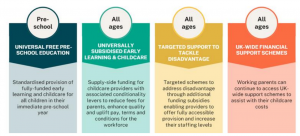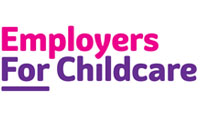How Stormont Ministers can tackle the Northern Ireland childcare crisis
It’s been quite a week in politics in Northern Ireland with the deal agreed with the Government to restore devolution, the appointment of Ministers and the establishment of new oversight Committees to hold Ministers and their departments to account. What has been encouraging to us, as the leading organisation lobbying for support with childcare for the past twenty years, is that childcare has been to the fore in all of this. From the appointment of Ministers when we heard First Minister Michelle O’Neill, deputy First Minister, Emma Little-Pengelly, Justice Minister Naomi Long and the Leader of the Opposition Matthew O’Toole all mention affordable childcare, to the first item of business next week being a motion on ‘high quality affordable childcare’.
This is all hugely positive – our political leaders recognise the value that investing in high quality, affordable childcare delivers – for children, parents, employers, our childcare sector, and the economy and society more broadly. What we now need to see is these warm words turned into meaningful actions, that support our struggling childcare sector, and hard-pressed families. And we need to see it quickly to tackle an ever-worsening childcare crisis.
Urgent intervention for childcare sector needed
With the National Minimum Wage set to increase again from April, childcare providers are facing yet another increase in their costs. Without support from Government they will have simply no choice but to pass this on to parents, by way of fee increases, which will be unaffordable for many families. With the average cost of a full-time childcare place in Northern Ireland now over £10,000 a year, this is more than the maximum supported through Tax-Free Childcare, meaning many families aren’t able to claim the full 20% childcare support that the scheme advertises.
We need to see an immediate package of financial support for childcare providers, to offset the increase to their costs and prevent another unaffordable fee increase for parents. The precedent for this type of support scheme is there, when during Covid-19, childcare providers were supported with the additional costs of adhering to Covid-19 guidance and to support their viability whilst operating with reduced demand for services. Whilst this was in the face of a major public health crisis, providers and families are equally facing into a crisis now as a result of rising costs, that could see some providers go out of business, and leave parents unable to access the childcare they need to work.
In tandem, we are urging local Ministers to write to Treasury calling for the removal of the annual cap on support available through Tax-Free Childcare, and an uplift in the support available, so that families can benefit from meaningful savings on the full amount of their registered childcare costs.
Progress on Early Learning and Childcare Strategy
Alongside short-term interventions, we also need to see a timeline for progress on the long-awaited and much-needed new Early Learning and Childcare Strategy, which is currently in development. Work on this has continued in the absence of an Executive, with the Department of Education working with stakeholders from across the sector and those in other jurisdictions to develop ‘costed options’ for consideration.
While we welcome this continued progress, now that the Executive is back in place, we need to see increased momentum on this and further engagement with the childcare sector to ensure that the options which are being assessed meet the needs of families and childcare providers. From our perspective, we need to see a new Early Learning and Childcare Strategy that has two clear objectives – supporting parents to work, and supporting children’s development, that enables them to have the best start in life, and improves their long-term outcomes.
It is clear from our research, over many years, that the time when parents find it most difficult to access and afford the childcare they need, is when they are returning to work, immediately after maternity leave, and require childcare for their youngest children (those aged 0-2). We need to ensure that whatever funding model is delivered by the new Strategy, that it supports parents with children of all ages, and this support is available across all 52 weeks of the year.
It’s also essential that policy-makers in Northern Ireland learn from, and improve upon, the funding schemes that are available elsewhere, particularly the 30 hours free childcare scheme in England, which has been inadequately funded and has led to significant issues both for families accessing the scheme and childcare providers delivering it.
Proposed funding model
Employers For Childcare has been constructive in developing proposals for a bespoke funding model for the childcare sector in Northern Ireland to better meet the needs of all families, incorporating:
- Universal, free provision of 22.5 hours of early learning and childcare for children in their immediate pre-school year.
- A core-funding subsidy for all registered childcare providers covering a portion of the costs of delivering quality early education and childcare, enabling them to reduce the fees they charge parents. The subsidy should be increased over time, as public finances allow, further reducing fees for parents.
- A strengthening of the support aimed specifically at tackling disadvantage, including targeted subsidies for providers and expansion of Sure Start services.

Other key measures we have recommended for inclusion in the new Early Learning and Childcare Strategy include:
- New legislation to establish a statutory basis for the financing, supervision and coordination of the delivery of early learning and childcare services
- A Workforce Strategy for the sector informed through a meaningful review of childcare regulations and standards.
To read more about these proposals, download our latest briefing ‘Tackling disadvantage through childcare in Northern Ireland’ here.
Commenting on the proposals, Aoife Hamilton from Employers For Childcare said: “Quality, affordable early education and childcare plays an essential role in tackling disadvantage by enabling parents to work and helping give children and young people the best start in life. Our recommendations are designed to inform ongoing work to develop options for the new Early Learning and Childcare Strategy. While further work is needed to advance the proposals, they offer a starting point from which to engage collaboratively across the sector to co-design an early learning and childcare system that achieves its greatest potential for families, our economy and wider society.
The level of commitment to addressing this issue from our political leaders gives a strong sense of optimism that the will is there to deliver a world-leading early learning and childcare infrastructure for Northern Ireland. We look forward to working with Ministers and their political colleagues to deliver much-needed progress on this critical issue for our economy and society.”






